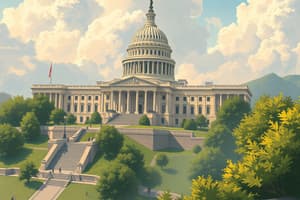Podcast
Questions and Answers
What is the presiding officer of the House of Representatives called?
What is the presiding officer of the House of Representatives called?
Speaker of the House
Who presides over the Senate?
Who presides over the Senate?
President of the Senate
What is the role of the president pro tempore?
What is the role of the president pro tempore?
To preside in the absence of the president of the Senate
What is a party caucus?
What is a party caucus?
What do floor leaders do?
What do floor leaders do?
What are whips in the context of the legislature?
What are whips in the context of the legislature?
What is a committee chairman?
What is a committee chairman?
What does the seniority rule entail?
What does the seniority rule entail?
What is a standing committee?
What is a standing committee?
What is a select committee?
What is a select committee?
What is a joint committee?
What is a joint committee?
What is a conference committee?
What is a conference committee?
What is a bill?
What is a bill?
What are joint resolutions?
What are joint resolutions?
What are concurrent resolutions?
What are concurrent resolutions?
What are resolutions in a legislative context?
What are resolutions in a legislative context?
What is a rider?
What is a rider?
What is a discharge petition?
What is a discharge petition?
What are subcommittees?
What are subcommittees?
What is the Committee of the Whole?
What is the Committee of the Whole?
What is a quorum?
What is a quorum?
What does engrossed mean in legislative terms?
What does engrossed mean in legislative terms?
What is a filibuster?
What is a filibuster?
What is cloture?
What is cloture?
What is a veto?
What is a veto?
What is a pocket veto?
What is a pocket veto?
Flashcards are hidden until you start studying
Study Notes
Legislative Leadership and Structure
- Speaker of the House: Presiding officer in the House of Representatives, elected by the majority party.
- President of the Senate: The Vice President of the United States serves in this role; in state legislatures, it may be the lieutenant governor or a senator.
- President Pro Tempore: A senator who presides over the Senate in the absence of the President of the Senate.
Party Organization
- Party Caucus: A closed meeting where members of a political party in the House or Senate gather, often called a party conference.
- Floor Leaders: Party-selected members in the House or Senate who guide party actions and legislative strategies.
- Whips: Assistants to floor leaders responsible for vote management and member communication.
Committees and Legislative Process
- Committee Chairman: Leader of a standing committee within a legislative body.
- Seniority Rule: Traditional guideline granting top positions in Congress, especially chairmanships, to members with the longest service.
- Standing Committee: Permanent subunit of a legislative body addressing specific subjects.
- Select Committee: Temporary legislative committee formed for a defined purpose; also referred to as a special committee.
- Joint Committee: Composed of members from both the House and Senate.
- Conference Committee: Temporary joint committee tasked with reconciling differences between House and Senate versions of a bill.
Legislative Proposals and Resolutions
- Bill: A proposed law awaiting consideration by a legislative body.
- Joint Resolutions: Proposals that become law upon passage, often related to specific or temporary matters.
- Concurrent Resolutions: Joint statements on issues from both houses that lack legal force and do not require presidential approval.
- Resolutions: Measures related to either house's business or opinions, which do not carry legal weight.
Legislative Tactics and Procedures
- Rider: Controversial addition to an important bill designed to pass through Congress inadvertently.
- Discharge Petition: Allows members to bring a bill that has been stalled in committee to the floor for voting.
- Subcommittees: Smaller divisions within a committee focused on specific issues.
Legislative Operations
- Committee of the Whole: Inclusive committee involving the entire legislative body to streamline business procedures.
- Quorum: Minimum number of members required for a legislative body to conduct business, typically a majority.
Finalization and Voting
- Engrossed: Final printed version of a bill.
- Filibuster: Tactics, often lengthy speeches, employed to delay or prevent a vote on a bill in the Senate.
- Cloture: Procedure to limit or end debate on a bill in the legislative body.
- Veto: The power of the chief executive to reject a bill, originating from the Latin term meaning "I forbid."
- Pocket Veto: A type of veto that occurs when the executive inaction on a bill happens after the legislature has adjourned, failing to sign or reject it within the specified time.
Studying That Suits You
Use AI to generate personalized quizzes and flashcards to suit your learning preferences.




